Any development occurring in sleep, in pregnancy or the first 2 years of life, if lost, is irreplaceable.
Genetic factors impacting sleep, such as chronotypes
Low or high sleep needs
Ability to rebound after sleep loss
Enviromental impacts; epigenetic of sleep.
The ability for a child to stay awake, their tolerance of the chemical adenosine
Overtiredness/Untiredness
Cortisol with overtiredness, impacting learning events
Routines of bedtime and consistency
Patterns of parent actions & baby’s response
Unpredicability causes instability in infant asleep
The brain is very active during sleep, light can disrupt linking sleep as well as shift the body clock.
During sleep is when memories, skills, and new neural pathways are made. If memory transfer is happening when baby is woken, the brain will discard the information.
Even though you may assume a baby is “low sleep needs” only two percent of the population are truly low sleep needs and are outliers on the general population of sleep needs. Low sleep needs, also does not look like ALL short naps.
Behavioural understanding 50-75%
Although sleep feels like a bodily function that the body should simply just “do”, babies don’t sleep when they want to sleep.
Like feeding, sleep is a necessity that is needed to be facilitated and taught.
The child takes on the parents body clock inurtero, as well as having genetic compentents such as being an early bird or night owl, which is 25-50% of sleep structure.
In the first 2 years of life the brain does 90% of it’s growth.
poor infant sleep habits have been found to impact:
Executive functioning
Ability to learn and engage
Behaviour
Parental mental health
The circadian rhythm
Sleep duration
Memory consolidation
Immune function
Infant temperament
Physical growth
Having short nighttime sleep duration and long daytime sleep duration in infancy can be detrimental to children’s neurocognitive development.
Infants who sleep longer at night have an easier time and higher capacity for executive functioning later in life. Especially related to strong impulse control.
Sleep is the one time in the day where the immune system is able to restore, and the brain is able to clear out.
Without significant sleep, the immune system is not able to function well.
Less than or equal to 7 hours was related to lower mental development index scores.
Lack of sleep leads to higher rates in Parental Mental Health issues. With Peri/Postnatal Depression rate signifncantly increasing with sleep deprivation.
Continuing to co-sleep by 6 months of age is associated with sleep disruption in mothers, more frequent night wakings in infants and co-parent distress.
Teti, D. M., Shimizu, M., Crosby, B., & Kim, B.-R. (2016). Sleep arrangements, parent–infant sleep during the first year, and family functioning. Developmental Psychology, 52(8), 1169–1181.
Research shows that an infant’s ability to learn a new task is related to their own level of stress (cortisol in the brain) rather than to their caregivers. This emphasizes the importance of using strategies to allow baby’s best learning and not CIO.
A consistent bedtime routine is associated with longer night time sleep, less time falling asleep, and less fragmented sleep.
Our Sources
Teti, D. M., Shimizu, M., Crosby, B., & Kim, B.-R. (2016). Sleep arrangements, parent–infant sleep during the first year, and family functioning. Developmental Psychology, 52(8), 1169–1181.
Volkovich, E., Bar-Kalifa, E., Meiri, G., & Tikotzky, L. (2018). Mother-infant sleep patterns and parental functioning of room-sharing and solitary sleeping families: a longitudinal study from 3 to 18 months. Sleep (New York, N.Y.), 41(2), 1. https://doi.org/10.1093/sleep/zsx207
Douglas M. Teti, Corey J. Whitesell, Jacqueline A. Mogle, Brian Crosby, Orfeu M. Buxton, Karen L. Bierman, David M. Almeida; Sleep Duration and Kindergarten Adjustment. Pediatrics August 2022; 150 (2): e2021054362. 10.1542/peds.2021-054362
Elizabeth L. Adams, Jennifer S. Savage, Lindsay Master, Orfeu M. Buxton,
Time for bed! Earlier sleep onset is associated with longer nighttime sleep duration during infancy, Sleep Medicine, Volume 73, 2020, Pages 238-245, ISSN 1389-9457, https://doi.org/10.1016/j.sleep.2020.07.003.
Shuting Cao, Juan Liu, Yuanyuan Li, Shunqing Xu, Wei Xia. Associations of sleep duration with neurocognitive development in the first 2 years of life. Journal of Sleep Research. 31(5) 23 January 2022. https://doi.org/10.1111/jsr.13554
Bernier A, Beauchamp MH, %Bouvette-Turcot AA, Carlson SM, Carrier J. Sleep and cognition in preschool years: specific links to executive functioning. Child Dev. 2013;84(5):1542–1553
LeBourgeois MK, Hale L, Chang AM, %Akacem LD, Montgomery-Downs HE, Buxton OM. Digital media and sleep in childhood and adolescence. Pediatrics. 2017;140(Suppl 2):S92–S96
Jodi A. Mindell, Melisa Moore; Does Sleep Matter? Impact on Development and Functioning in Infants. Pediatrics December 2018; 142 (6): e20182589. 10.1542/peds.2018-2589
Sabrina T. Voltaire, Douglas M. Teti,Early nighttime parental interventions and infant sleep regulation across the first year, Sleep Medicine, Volume 52, 2018, Pages 107-115, ISSN 1389-9457, https://doi.org/10.1016/j.sleep.2018.07.013.
Marissa Sgro and others, Synchronizing our clocks as we age: the influence of the brain-gut-immune axis on the sleep-wake cycle across the lifespan, Sleep, Volume 45, Issue 3, March 2022, zsab268, https://doi.org/10.1093/sleep/zsab268
Raymond E.A. Sanchez, Franck Kalume, Horacio O. de la Iglesia, Sleep timing and the circadian clock in mammals: Past, present and the road ahead, Seminars in Cell & Developmental Biology, Volume 126, 2022, Pages 3-14, ISSN 1084-9521, https://doi.org/10.1016/j.semcdb.2021.05.034.
Korownyk, C., & Lindblad, A. J. (2018). Infant sleep training: Rest easy? Canadian Family Physician, 64(1), 41–41.
Besedovsky, L., Lange, T. & Born, J. Sleep and immune function. Pflugers Arch - Eur J Physiol 463, 121–137 (2012). https://doi.org/10.1007/s00424-011-1044-0
Cortesi F, Giannotti F, Sebastiani T, %Vagnoni C, Marioni P. Cosleeping versus solitary sleeping in children with bedtime problems: child emotional problems and parental distress. Behav Sleep Med. 2008;6(2):89–105



















